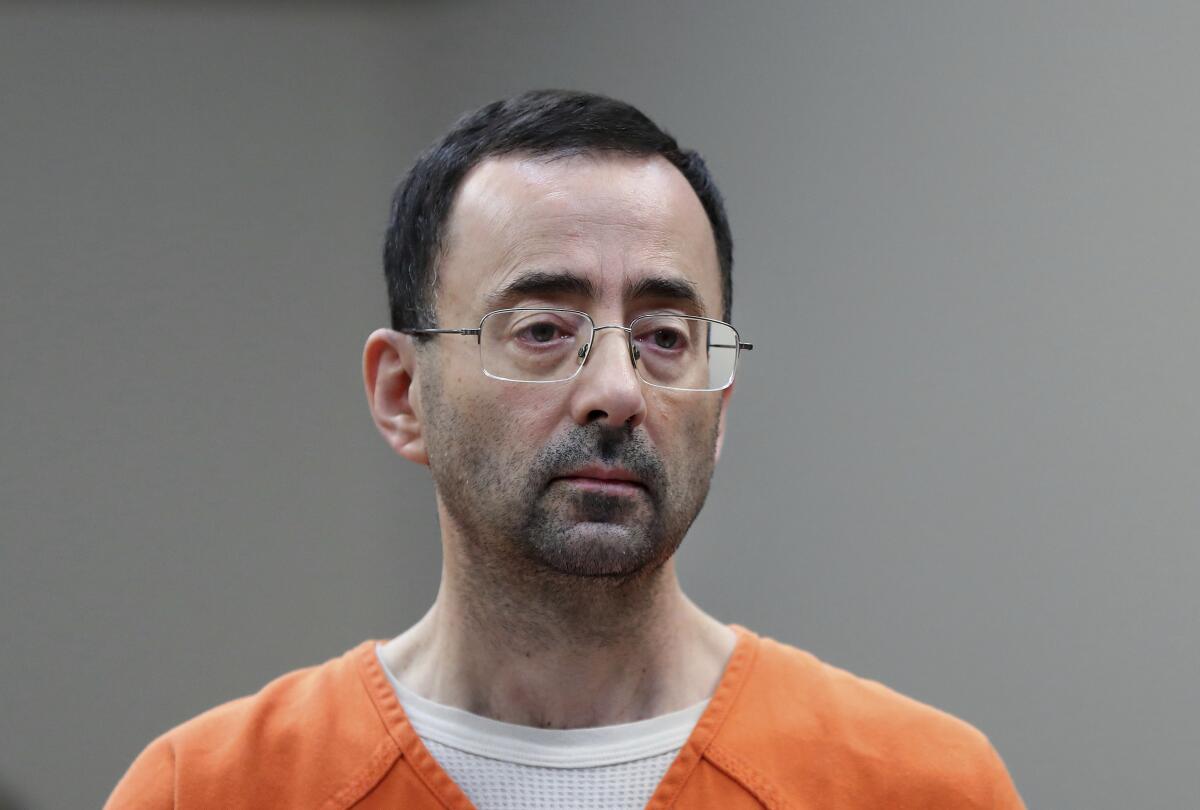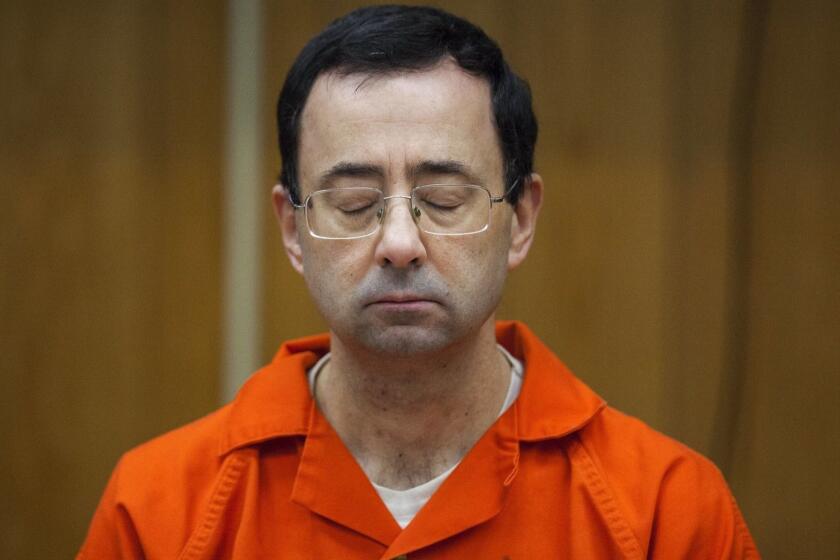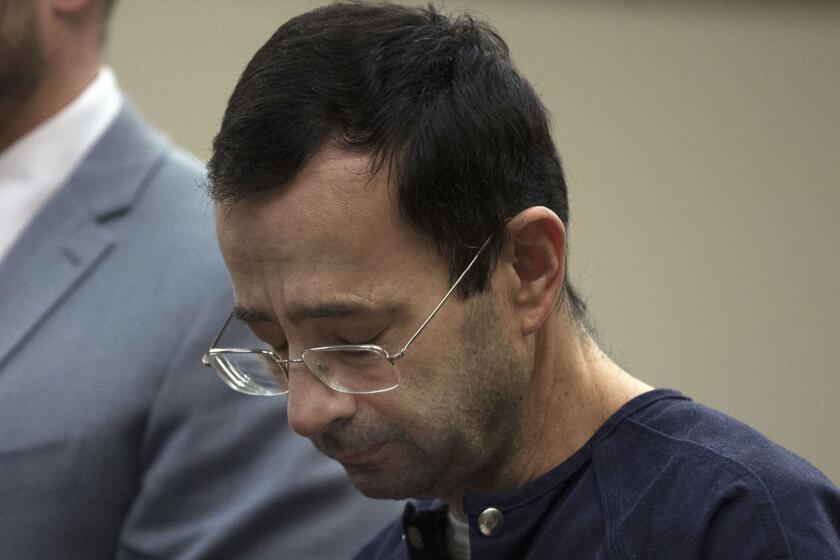FBI made serious errors during sex abuse investigation of Larry Nassar, Justice Department says

WASHINGTON — The Justice Department’s internal watchdog sharply criticized the FBI’s inquiry into former Olympic team doctor Larry Nassar on accusations of molesting scores of young gymnasts, concluding in a lengthy report released Wednesday that agents made “fundamental errors” in their investigation and did not respond with a sense of urgency to the allegations.
The 119-page report by the Justice Department’s inspector general paints a damning portrait of how the FBI mishandled serious allegations against Nassar, who was a team doctor for the U.S. Olympic team, USA Gymnastics and Michigan State University.
While the inspector general was especially critical of agents in Indianapolis for failing to take the allegations seriously, he also found that agents in Los Angeles had neglected to take actions that would have mitigated “the ongoing danger that Nassar posed.”
In the 14 months between the first reports of abuse to the FBI in July 2015 and the raid of Nassar’s home by local police in September 2016, about 70 young athletes were allegedly abused by the doctor, the inspector general noted, citing a review of civil court filings.
The watchdog report is the latest examination into how failures of oversight and detection by vaunted U.S. athletic programs and federal investigators allowed a trusted doctor to abuse scores of young athletes under the guise of providing them medical treatment. The scandal prompted a wave of soul-searching by sports officials, internal investigations, lawsuits and proposed legislation to reform U.S. Olympic programs.
USA Gymnastics — the sport’s national governing body that selects the U.S. Olympic team — and the U.S. Olympic Committee, which has since renamed itself the U.S. Olympic & Paralympic Committee, or USOPC — have faced litigation, greater oversight and extensive staff changes. Michigan State has paid $500 million so far to settle claims.
Nassar, who was arrested two months after the raid on his house, was sentenced in 2018 to 40 to 175 years in prison after pleading guilty to state charges of sexual assault and federal charges of possessing child pornography. The inspector general’s report said FBI investigators determined the doctor had sexually assaulted over 100 victims and possessed thousands of images of child pornography.
The inspector general, Michael Horowitz, began his investigation into the FBI in 2018 after news reports and statements from lawmakers and victims raised concerns about the thoroughness of bureau’s inquiry.
John Manly, a lawyer for gymnasts McKayla Maroney and Aly Raisman and many other athletes who were sexually abused by Nassar, said the report might be “the most damning thing [he had] ever read about a law enforcement agency. An entire office of the FBI concealed Larry Nassar’s sexual abuse of athletes.”
Manly said his clients want the Justice Department to appoint a special prosecutor “because there has been a cover-up.”
The FBI did not contest the findings.
“As the inspector general made clear in today’s report, this should not have happened. The FBI will never lose sight of the harm that Nassar’s abuse caused. The actions and inactions of certain FBI employees described in the report are inexcusable and a discredit to this organization,” the FBI said in a statement.
The bureau added that it had already taken steps to ensure that those who committed “misconduct and breach of trust no longer work FBI matters,” and said it had implemented changes to share with other police agencies.
Lawmakers of both major parties said Wednesday they were shocked by Horowitz’s findings and hoped the Justice Department would take action against those who failed to take the allegations seriously.
An independent investigation has provided new insight into the U.S.
“We are appalled by the FBI’s gross mishandling of the specific warnings its agents received about Larry Nassar’s horrific abuse years before he was finally arrested,” said Sens. Richard Blumenthal (D-Conn.) and Jerry Moran (R-Kan.), who have introduced legislation to reform the U.S. Olympic & Paralympic Committee.
“How many athletes would have been spared unimaginable pain if the FBI had done its job?” they continued. “The Department of Justice now needs to decide if it is going to be yet another institution that fails survivors or if it is going to enforce some measure of accountability for these crimes.”
In a statement, the USOPC said it “has taken extensive steps to combat sexual abuse, strengthen protections in amateur sports and support survivors.” The organization noted it had ordered an independent commission that “led to significant reforms to prevent such reprehensible acts from ever occurring again.”
The inspector general’s report focused particular attention on what went wrong in the FBI’s Indianapolis office, where USA Gymnastics first reported the abuse claims in July 2015.
In a meeting with agents, Steve Penny, head of USA Gymnastics, handed over “graphic information” that three gymnasts had been sexually assaulted by Nassar, Horowitz found. The gymnasts are not identified by name, but Manly said Maroney was one of them.
The Indianapolis agents did not seem to take the allegations seriously, according to the report. Agents did not formally document their investigative activity, the inspector general found, and interviewed just one victim, Maroney, by telephone. They did not reach out to the other victims.
Though agents and a federal prosecutor determined in September 2015 that they did not have jurisdiction in Indiana to bring a case, they did not alert local authorities in Michigan and Texas to the threat posed by Nassar.
The doctor worked for Michigan State and lived near the East Lansing university, serving as team physician for a wide range of Michigan State athletes in addition to the school’s gymnastics team. He also treated patients at the USA Gymnastics National Team Training Center in Texas.
The Indianapolis-based agents also neglected to transfer the investigation to an FBI office in Michigan, despite a recommendation by a federal prosecutor that it was the best jurisdiction to bring an investigation because the doctor lived and worked there.
“Senior officials in the FBI Indianapolis Field Office failed to respond to the Nassar allegations with the utmost seriousness and urgency that they deserved and required, made numerous and fundamental errors when they did respond to them, and violated multiple FBI policies,” the report concluded. “The absence of any serious investigative activity was compounded when the Indianapolis Field Office did not transfer the matter to the FBI office [in Lansing], where venue most likely would have existed.”
A day after Larry Nassar’s sentencing, two U.S. senators have demanded answers regarding the “multiple organizational failures” that allowed the former Olympic team doctor to molest scores of young athletes over the course of decades.
The report detailed a string of errors by W. Jay Abbott, the special agent in charge of the Indianapolis office, who has since been examined for possible prosecution by the Justice Department’s Office of Public Integrity. Prosecutors declined in September to bring a case against Abbott, the report said, though it concluded that Abbott had made false statements to investigators about an interview he had conducted with Maroney.
In the midst of the Nassar investigation, Abbott also discussed job opportunities with Penny of USA Gymnastics, and later made false statements to investigators about those job discussions and his handling of the Nassar allegations, the inspector general found.
“Abbott exercised extremely poor judgment by failing to consult with a designated agency ethics official regarding his ongoing involvement in Nassar investigation discussions at the same time he was seeking Penny’s help and guidance about a U.S. Olympic Committee job opportunity. Abbott should have known — and in fact did know according to the evidence we found — that his actions would raise a question regarding his impartiality,” Horowitz wrote.
The report was not as harsh on agents in Los Angeles, noting that they conducted a thorough investigation, interviewing witnesses and victims and gathering evidence. However, the watchdog concluded, they failed to act with “prudence or sound judgment” when they neglected to alert local and federal authorities in Michigan and Texas to what they had uncovered — a delay that allowed Nassar to continue his abuse.
USA Gymnastics reported the abuse to the Los Angeles FBI office because one of the victims lived in the area and the office was among the bureau’s largest. The L.A. agents, like those in Indianapolis, failed to alert counterparts in Michigan to the danger posed by Nassar.
FBI agents in Michigan only learned about Nassar from news reports detailing the allegations and a Michigan State University police raid on his residence that turned up a trove of child pornography.
Horowitz’s report recommends that the FBI clarify when agents must alert local authorities to potential crimes against children, improve how the bureau documents and oversees the transfer of investigations between offices, and develop a policy on when child victims may be interviewed by phone.
Former gymnast Rachael Denhollander, who was among the first to speak out against Nassar’s abuse, vented her frustration about the absence of consequences on Twitter Wednesday.
“There is no accountability. No criminal charges. No justice. No restitution for the damage they caused. No punitive actions. This report lays bare the corruption, but it’s conclusion says ‘doesn’t matter.’ Because nothing happens now,” Denhollander wrote.
“The rest of us are left with the lifelong consequences, and already bore the cost of pushing for the truth,” she continued. “And these agents retire on government pensions while survivors fight to stay alive. Nothing happens now.”
Wharton and Winton reported from Los Angeles.
More to Read
Get the L.A. Times Politics newsletter
Deeply reported insights into legislation, politics and policy from Sacramento, Washington and beyond. In your inbox three times per week.
You may occasionally receive promotional content from the Los Angeles Times.















